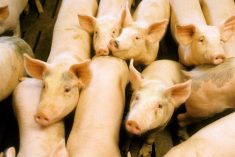On Feb. 4, Prime Minister Harper and U.S. President Obama created a U.S.-Canada Regulatory Co-operation Council (RCC) with a mandate to reduce regulatory red tape at the border.
The leaders pledged to remove barriers to the trade of goods between the two countries, with specific reference to food. Food and agricultural products were highlighted because of the size of the trade and the long-held perception that this is an area particularly in need of greater regulatory co-operation.
Not including fish, our annual food and agricultural two-way trade exceeds $32 billion. This is a critical issue for Canada; our food and agricultural exports to the U.S. of $16.2 billion represents 47 per cent of our total agricultural exports.
Read Also

Peak of the Market named to industry award
Peak of the Market was recently recognized for strengthening the link between Manitoba farmers and local food service kitchens.
It must be made clear that this major announcement by the two leaders was not a response to myFood in Canadaarticle titled “The ambassador” s Cheerios,” in which I expressed deep skepticism that there would be any regulatory harmonization any time soon. No, I can’t take credit for the RCC because while I wrote and submitted the column in January, I must admit it wasn’t first published
until a week after the announcement.
Is there anything different in this initiative to suggest that it might be any more successful than the many previous trilateral exercises that were announced with such great fanfare and achieved so little? From conversations with officials on both sides who insist that there is high-level political support, I am persuaded that there may be a better chance for this process. What’s different this time?
First, this is a bilateral process. There is a broad consensus that the trilateral agendas and the North American Free Trade Agreement have run out of gas. For the first time since NAFTA’s inception, there are dual bilaterals; both a U.S.-
Mexico and a U.S.-Canada process. The now-17-year-old NAFTA is not equipped to deal with the deeper levels of trade integration required following progressive elimination of most tariff barriers and many non-tariff barriers in the years following 1994.
Second, the time is right for new thinking on co-operation in Canada-U. S. commercial policy. The recent financial crisis has caused both governments to refocus government attention on efficiency and North American regional competitiveness, especially relative to Europe and the emerging markets where regulatory cooperation has been given a high priority.
Finally, the emphasis is on cooperation, not harmonization. As I argued in the earlier column, to the U.S., “harmonization” means Canada changing its regulations – the U.S. has no intention of changing its agriculture and food regulations to harmonize with Canada.
The fact is, that most of Canada’s product regulations and standards are already aligned with those of the U.S. except for those where a public policy decision has been made to maintain difference. If Canada decides that it is in its trade interests to harmonize unilaterally, we always have.
While there is little likelihood of making progress on negotiations for regulatory harmonization, there is increasing anecdotal evidence of the need for serious negotiations on practical implementation issues.
For instance, I have seen cases of duplicate testing and inspections; I have seen overly aggressive get-even auditing by both countries, with the food company caught in the middle, and we are still faxing import and export certificates. Instead, we could co-operate on international audits. There may be opportunities for the cross-appointment of personnel, and we could make greater use of equivalency agreements. We already have legislative authority under theMeat Inspection Act and Regulationsto get rid of the useless “inspections” of meat that involve a huge waste of time and fuel, and other costs. This could be a priority for the RCC.
Progress will require sustained political momentum.
Ronald L. Doering, a past president of the Canadian
Food Inspection Agency, practises food law in the
Ottawa offices of Gowling Lafleur Henderson LLP. He also
chairs the federal agriculture minister’s advisory board on
food safety. Contact him at [email protected].
———
Thereisabroadconsensusthatthetrilateral agendasandtheNorthAmericanFree TradeAgreementhaverunoutofgas.













